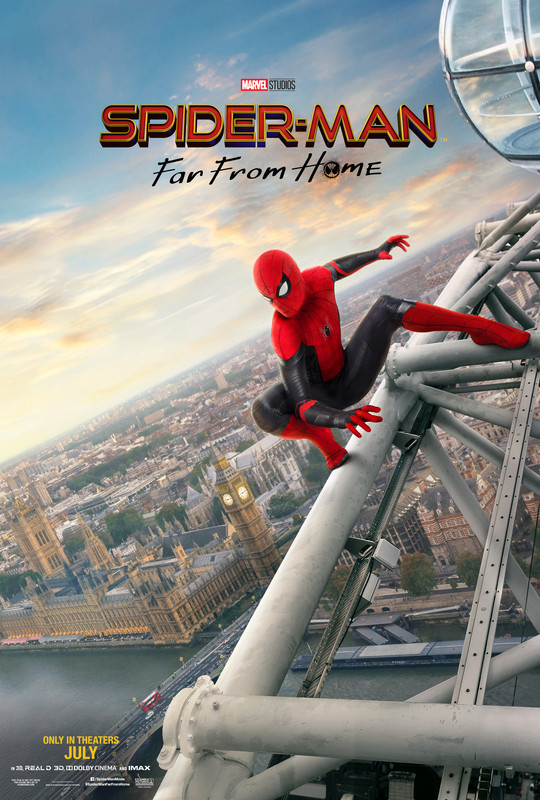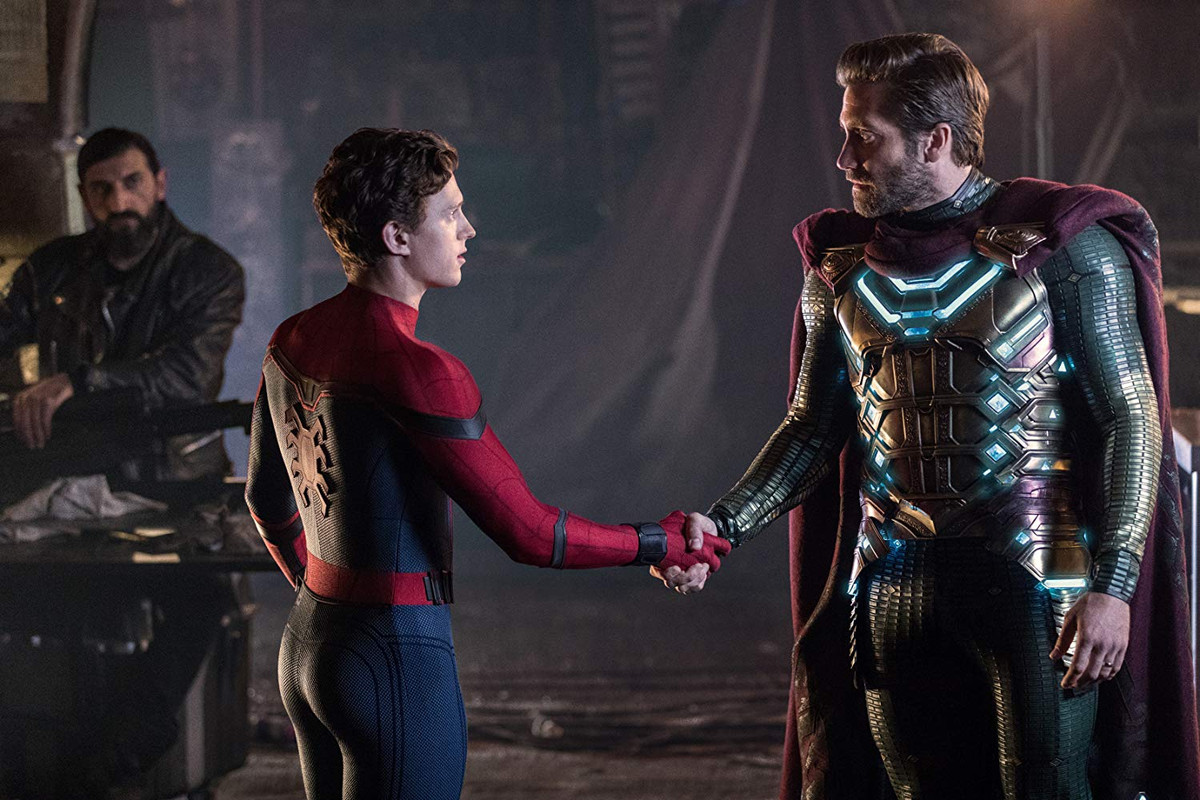Dir: Jon Watts
The second of the MCU’s Spider-Man films, and the closing film of Marvel’s Phase 3, Spider-Man: Far From Home picks up after the events of Avengers: Endgame. With Tony Stark gone, the world is looking to other heroes, as is Nick Fury (Samuel L Jackson). When reports begin of massive beings called elementals and of Quentin Beck (Jake Gyllenhaal), a soldier from another dimension trying to fight them, Fury calls in Spider-Man to assist. At least, he tries to. Peter Parker (Tom Holland) has a lot on his plate, juggling being a superhero with his life after the blip; most pressingly a school trip to Europe and a plan to tell MJ (Zendaya) how he feels about her. He doesn’t have time for Nick Fury, especially with this new hero, quickly nicknamed Mysterio, on the scene.
I’d call myself a casual observer of the Marvel Cinematic Universe. With a little distance from them, it’s probably only the first two Captain America films and Spider-Man: Homecoming that I’d say are, qualitatively, anything more than solid pieces of blockbuster filmmaking. On the other hand, I love Spider-Man. I always have. I love the 70s series with Nicholas Hammond in all its cheesy crappiness. I love the 90s cartoon. I love a lot about Sam Raimi’s trilogy of films, and... almost nothing about The Amazing Spider-Man reboots (reviews here and here). Homecoming was pretty much everything I ever wanted from a Peter Parker Spider-Man film, and the first film to manage to square the circle of the character and get both Peter and Spider-Man right, at least for me. Then Into the Spiderverse raised the bar. I didn’t have much investment in Miles Morales going in, having stopped reading Spider-Man books a few years before he came along, but I certainly had that investment on the way out (as well as an appreciation for the film’s dazzling art style). That film and Avengers: Endgame present challenges for this film, challenges it never manages to overcome.
Homecoming had a studiedly low key feel to it. As we first met Holland’s Spidey in the midst of a big action sequence in Captain America: Civil War, his own film deliberately foregrounded the idea of Peter as a relatively nomal teenager and of Spidey as ‘Your Friendly Neighbourhood Spider-Man’. It did the big action well too, and had a menacing villain in the shape of Michael Keaton’s Vulture, but the largely ground level feel of it (depsite the web slinging) was a great plus. With that groundwork laid, the mix doesn’t work the same way this time out. We don’t feel the effects of ‘the blip’ (the five year gap between the people who survived Thanos’ snap and those who didn’t) enough. Rather than just have one third string character be that much older, would it not have been interesting for the dynamics of their relationship if Ned had survived the snap and was now several years further on than his friend Peter? Certainly it would be more interesting than Ned’s storyline, which screams that screenwriters Chris McKenna and Erik Sommers couldn’t think of anything to do with him.
Homecoming, not having to do an origin story, got its feet under it immediately, but the emphasis on the teen comedy aspect and the high school trip to Europe (which is so nakedly a plot facilitator that at a certain point the film doesn’t even bother pretending about it) means that as a Spider-Man film Far From Home is a slow starter. Even when there are action scenes, for much of the first half of the film, Mysterio is the driving force. Jake Gyllenhaal is a bit of a casting coup for this film, and he brings his customary dedication to the role, dealing well with the several gigantic exposition drops he has to do, while also managing to create an interestingly nuanced character and draw a relationship with Holland which, though close to what Sam Raimi did with Dr Octopus in Spider-Man 2, carries weight for Peter as he looks for a new mentor in the wake of the loss of Stark. Of course there is another mentor figure available in Nick Fury (both Jackson and Cobie Smulders as Maria Hill have an increased presence here), but without Peter ever saying it, I think it’s that Beck shows himself as a scientist as well as a warrior that means Peter is drawn to him. He sees an older version of himself there - or at least a version to aspire to - in a way that he doesn’t in a top spy like Fury.
Jake Gyllenhaal also helps bring out the best in Holland's performance, we can feel his pride when Beck tells him never to be ashamed of being the smartest person in the room, how it fuels that desire to see Beck as a mentor, and how this desire might not make for the best judgement. That said, it’s only in the second half of the film that we see Mysterio used to his full potential. The first action scene that deploys his illusions in their full force is absolutely fantastic. Jon Watts and the crew find some wonderful and very comic book inflected images and have great fun pulling surprises on the characters and on us. This and other sequences in the second half also use the connection we’ve seen built between Peter and Mysterio effectively, giving some emotional power to underlie the action.
In its first half, the film does mark time. Ned’s story with Betty Brant (Angourie Rice) is notable here. Rice is well cast, and fun in the newscast that opens the film, but both she and Jacob Batalon (who still has nice comic timing, especially opposite Holland) are underserved by a story so prosaic that the film explicitly declares that it’s abandoning it before the end credits. This is also true of a lot of the class trip stuff, like the fairly unfunny dynamic between Martin Starr and JB Smoove as the teachers and Tony Revolori’s one joke version of Flash Thompson. It’s also the case with a weirdly misplaced action sequence. Yes, Peter’s carelessness is a theme here, but it’s a bit overegged at one particular moment, especially given that the film has other instances that trade on the same idea, but feel much more in character for Peter. The only part of the class trip narrative that really engages is the dynamic between Peter and MJ. Zendaya is definitely a departure from the traditional MJ, in both look and attitude, but it completely works for me; she gets bigger laughs with a withering look than almost any of the film’s one-liners, and her ability to throw Peter off balance is always funny (the exchange at the opera, when Peter tells MJ she looks beautiful, is perfectly timed and played). For all the sarcasm she throws his way though, there’s a genuine sweetness about Peter and MJ too, it’s a different take, but a smart and well-executed one.
The best things in the film come in the third act, which ups the action to an epic scale, but it’s a challenge to discuss any of it because every part of it is predicated on massive spoilers. Suffice to say that the idea that has defined every version of Spider-Man is that ‘with great power comes great responsibility’ and that in these sequences Spidey is feeling that at a very personal level. It’s a classic hero's journey all about the choice this young kid has to make in embracing his role, his responsibility. It’s not something we haven’t seen in cinematic Spider-Man stories, but it’s still effective thanks to Holland’s performance and in no small part thanks to the stunt teams and digital artists who help create Spidey, whose movements have never felt more fluid.
It’s worth briefly addressing the first of the two post-credits scenes (stay for both, by the way). As a fan, I was at once elated at a certain piece of casting and somewhat thrown off by the depiction, which feels like a departure from the principals of the character, if only because of what the iconography suggests it’s referencing. I’m not sure how I feel about it, but along with the other things this sequence throws up, we’ll surely be dealing with it in the next film.
Then there are, of course, those twin problems of Into the Spiderverse and Endgame. As a Spider-Man film, Far From Home simply can’t help but feel like a damp squib after the blisteringly inventive Spiderverse (especially as it seeds a similar idea early on), it’s got fun action and is incredibly well executed, but the sheer visual verve of that film is nowhere to be found, nor is there a single image with a tenth of the power of the shot of Miles falling upwards through the frame. Equally, as a closer for Marvel’s third phase, it can’t help but feel like an anti-climax next to the monumental (though flawed) Endgame. All that said, though it does take a while to plod its way there and too many characters seem stuffed in just because they were there in the last film, rather than because there’s a great need for them here, once it kicks into gear, Far From Home is a highly entertaining, very well acted and sometimes thoughtful Spider-Man film. I had a great time with it in its second hour and again loved the depiction of both Peter and Spidey throughout, but I can’t deny it failed to give me the charge of excitement I had after Homecoming.
★★★



No comments:
Post a Comment